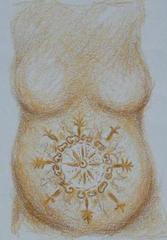Doula Information

Your doula will develop a relationship with you and your partner during pregnancy. She will help you to conceptualise your ideal birth and to develop your birth plan. During labour your doula will support you emotionally and physically, as well as help to maintain the correct birthing environment that you need to enhance the process of labour. The overall aim of your doula is to serve your needs in order to achieve the best possible birth experience for you.
Your doula will focus exclusively on your beliefs about birth. This means that she will not impose her own ideal of childbirth on you. The majority of doulas work in the hospital birth unit with women who choose medical care during labour.
Since you are paying privately for your doula you can also have her support you in early labour at home if this is approved by your hospital. Because women have better birth experiences when a doula supports them, more women in the western world are now employing a doula for their births. Because of this, the doula has become a valued member of the care team in birth units around the world.
Your doula will focus exclusively on your beliefs about birth. This means that she will not impose her own ideal of childbirth on you. The majority of doulas work in the hospital birth unit with women who choose medical care during labour.
Since you are paying privately for your doula you can also have her support you in early labour at home if this is approved by your hospital. Because women have better birth experiences when a doula supports them, more women in the western world are now employing a doula for their births. Because of this, the doula has become a valued member of the care team in birth units around the world.
A systematic review of evidence by the Cochrane library, which reviewed fourteen trials involving more than 5000 women, provides the most supportive argument for the use of doula care in labour (Hodnett, 2003). This review found that:
The continuous presence of a support person reduced the likelihood of medication for pain relief, operative vaginal delivery, caesarean delivery, and a 5-minute Apgar score less than 7. Continuous support was also associated with a slight reduction in the length of labour. Six trials evaluated the effects of support on mothers' views of their childbirth experiences; while the trials used different measures....in each trial the results favoured the group who had received continuous support.
Earlier research show similar findings. Following their review of this evidence Klaus, Kennell and Klaus (1993) itemised the positive effects of doula care as:
The continuous presence of a support person reduced the likelihood of medication for pain relief, operative vaginal delivery, caesarean delivery, and a 5-minute Apgar score less than 7. Continuous support was also associated with a slight reduction in the length of labour. Six trials evaluated the effects of support on mothers' views of their childbirth experiences; while the trials used different measures....in each trial the results favoured the group who had received continuous support.
Earlier research show similar findings. Following their review of this evidence Klaus, Kennell and Klaus (1993) itemised the positive effects of doula care as:
- 50% reduction on caesarean rates,
- 25% shorter labour,
- 60% reduction in epidural requests,
- 40% reduction in syntocinon use,
- 30% reduction in analgesia use,
- 40% reduction in forceps delivery.

It is recognised that the women who report negative experiences during the birth event, and their babies, are at increased risk of ill health in both the short and long term (Scott, Klaus & Klaus, 1999; Odent, 1984). Despite the fact that interventions during labour are known to lead to negative feelings, the use of interventions in childbirth continues to increase dramatically (Australian Institute of Health and Welfare, 2002; Gilliland, 2002). It has long been known that reducing fear by supporting the birthing event in as natural manner as possible reduces the need for interventions and enhances the outcomes (Kofinas, 1985; Lederman, et al., 1978: Levinson, Gershon & Shnider, 1979; Odent, 1984; Balaskas, 1992; Sauls, 2002). It therefore stands to reason that supporting the birth event in a way that reduces fear can only assist the woman in achieving a positive birth experience.

